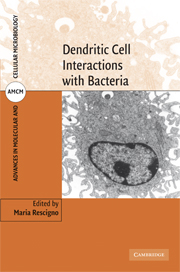Book contents
- Frontmatter
- Contents
- Preface
- List of Abbreviations
- List of Contributors
- I Dendritic cells and their role in immunity
- II Dendritic cells and innate immune responses to bacteria
- III Dendritic cells and adaptive immune responses to bacteria
- IV Dendritic cells and immune evasion of bacteria in vivo
- Index
- Plate section
Preface
Published online by Cambridge University Press: 12 August 2009
- Frontmatter
- Contents
- Preface
- List of Abbreviations
- List of Contributors
- I Dendritic cells and their role in immunity
- II Dendritic cells and innate immune responses to bacteria
- III Dendritic cells and adaptive immune responses to bacteria
- IV Dendritic cells and immune evasion of bacteria in vivo
- Index
- Plate section
Summary
Dendritic cells (DCs) comprise a family of professional antigen presenting cells that are unique in their ability to activate T lymphocytes. Dendritic cells patrol all the tissues at the interface with the external world, including skin and mucosal surfaces, for the presence of invaders. The DC system is characterized by a remarkable plasticity that allows the induction both of immunity and tolerance toward the encountered antigens. This is achieved through the combination of a number of different factors, including the subsets of DCs, their activation state and environmental cells that can regulate DC function. DCs are present in the periphery in an immature form that is particularly apt at capturing antigens and at deciphering the messages associated therein. After an activation stimulus that is delivered by some antigens (including bacteria) or by inflammatory cytokines released during inflammation, activated DCs acquire a migratory phenotype and reach the draining lymph node. Here, DCs present the antigens captured in the periphery and initiate T cell adaptive immune responses.
This book describes how the intimate interplay between dendritic cells, bacteria and the environment dictates the induction of immunity or tolerance to bacteria and how pathogenic bacteria have evolved strategies to escape DC patrolling. The first section introduces the complexity of the DC system describing the different subpopulations of DCs and their role in the induction of immune responses.
Information
- Type
- Chapter
- Information
- Dendritic Cell Interactions with Bacteria , pp. ix - xiiPublisher: Cambridge University PressPrint publication year: 2007
